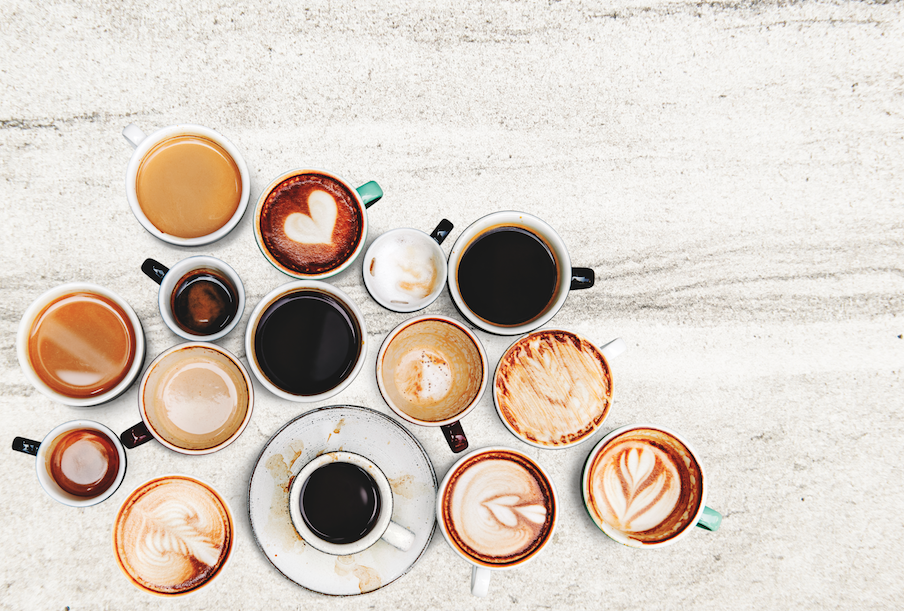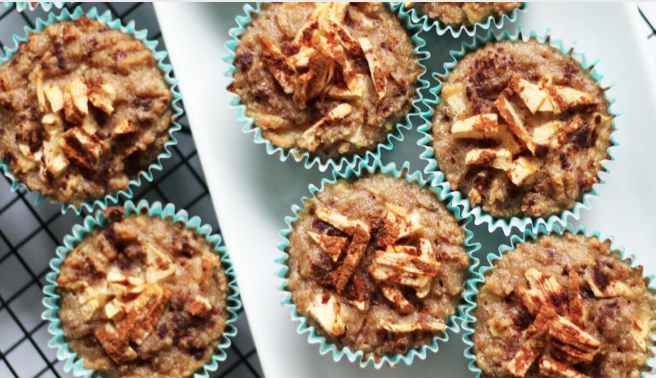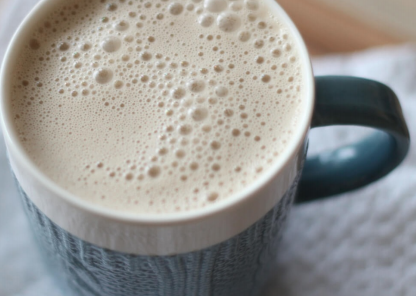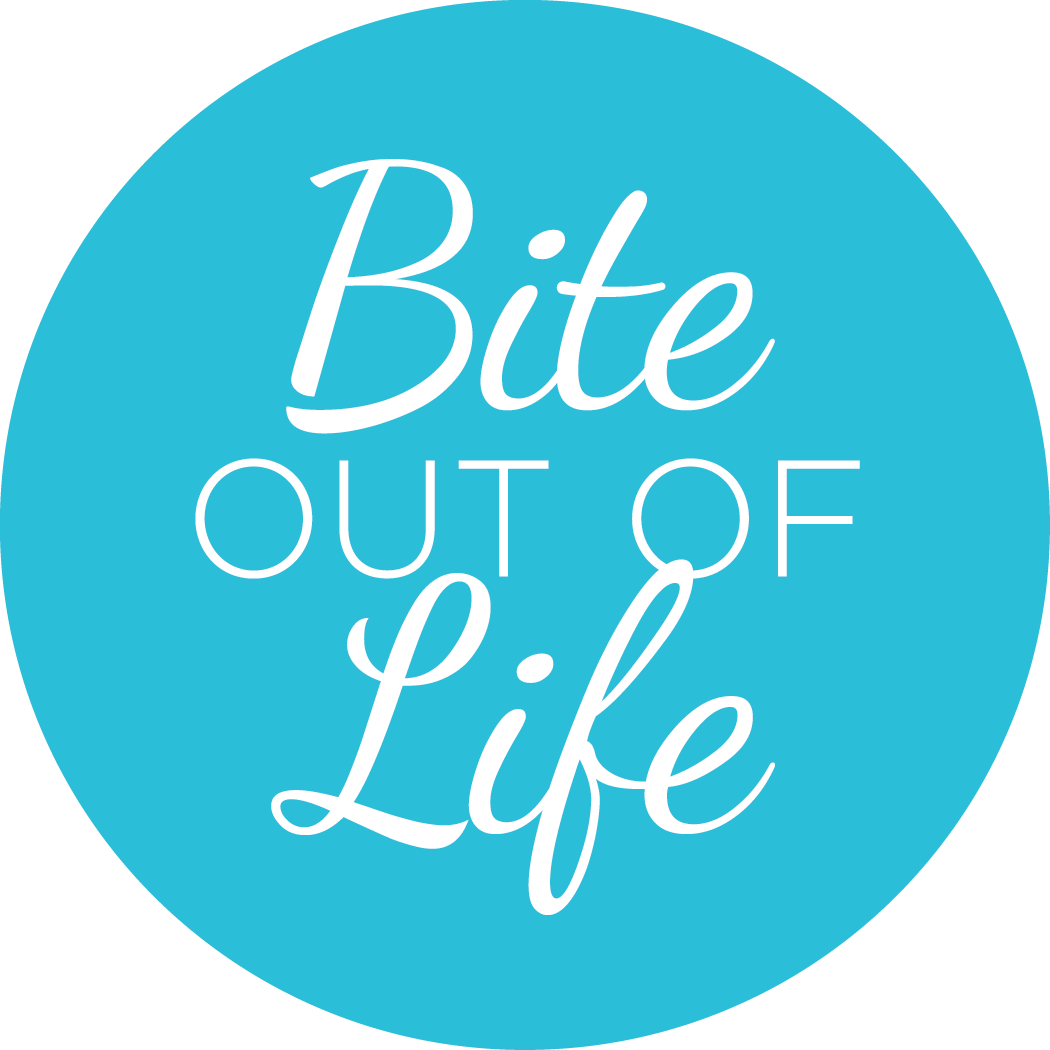
Phew. Try that tongue twister 3 times fast!
AProperCoffeeInACopperCoffeeCup.
AProperCoffeeInACopperCoffeeCup.
AProperCoffeeInACopperCoffeeCup.
And then try it after the caffeine kicks in from a cuppa Joe (or two)!
If you’re wondering just how much proper coffee I’ve had today in a copper coffee cup, well let me tell ya: I had to drink something while taste testing my Apple Spice Muffins Recipe for you (at the end of this blog post!) (And yes – I was kidding about the multiple cups of coffee but not kidding about the muffins, though – so keep reading).
Why was I making these spicy schmecky good muffins? To celebrate National Coffee Cake Day. Yes there is such a thing. I know there’s also a National Hot Dog Day but don’t count on me to be celebrating that!
Anyway, coffee cake doesn’t typically have coffee in it, but it’s origins come from the idea of eating something sweet while you drink your coffee. (Why else do you think donuts and baked pastries are always sold in coffeeshops?!)
On the plus side, coffee cake often contain cinnamon, which may help balance out blood sugar. It also commonly contains nutmeg, where some of its components may play a role in controlling the development of dental cavities. Nutmeg may also supply you with some anti-oxidants to fight free radical damage in your body.
But before you rush out and nosh on some goodies that contain a pound of butter and a pound of sugar that is a traditional coffee cake….know that these spices are generally not included in high enough quantities to counteract those ingredients and to make a difference in your health.
So, time to reach for something a little healthier and just as yummy. Go ahead, try out my Apple Spice Muffins below and let me know how it goes!
Since I’ve borrowed the flavour profile of my muffins from traditional coffee cake, I still enjoy having it with a coffee.
National Coffee Cake Day is a good excuse to talk about coffee too, right? Lots of myths and misconceptions around this drink.
You might be wondering: is coffee considered “healthy” this week? Or is it “terrible for you”? Will drinking ‘bulletproof coffee’ really help me burn fat? It seems like a bitter drink to swallow, but experts can’t seem to make up their minds about this beverage and whether it has healthful properties or not.
I get asked this question all the time – and the answer, as with so many claims around healthy foods is “it depends.”
There is actual science behind why different people react differently to it. It’s a matter of your genetics and how much coffee you’re used to drinking and how you are able to metabolize the caffeine that is in coffee.
A word about caffeine: caffeine is a stimulant – but coffee is not necessarily the villain when it comes to caffeine. It’s just one source – tea, cola, chocolate all contain caffeine as well (and don’t get me started on the energy drinks – absolutely no good can come of consuming those!)
Coffee contains between 50-400 mg of caffeine/cup, averaging around 100 mg/cup. And when I say ‘cup’, I mean 8 ounces, not a grande or venti size from that specialty café.
While coffee is one of the most popular ways to consume this stimulant, it also contains a lot of things over and above the caffeine. Not just water, but antioxidants, and hundreds of other compounds. These are the reasons drinking a cup of coffee is not the same as taking a caffeine pill or drinking a ridiculous energy drink or cola.
Let’s look at caffeine metabolism, its effects on the mind and body, and whether coffee drinkers have higher or lower risks of disease. Then I’ll give you some points to consider when deciding if coffee is for you or not.
Caffeine Metabolism
Not all people metabolize caffeine at the same speed. How fast you metabolize caffeine will impact how you’re affected by the caffeine. In fact, caffeine metabolism can be up to 40x faster in some people than others.
About half of us are “slow” metabolizers of caffeine. We can get jitters, heart palpitations, and feel “wired” for up to 9 hours after having a coffee. The other half is made up of “fast” metabolizers of caffeine. They get energy and increased alertness and are back to normal a few hours later.
This is part of the reason those headlines contradict each other so much – because we’re all different!
The Effects of Coffee (and Caffeine) on the Mind and Body
NOTE: Most studies look at caffeinated coffee, not decaf. But don’t be fooled, decaf coffee still contains caffeine, just much lower amounts. And the way a coffee is decaffeinated (ie: the process) may be worse for you than just drinking a smaller amount of caffeinated coffee.
The effects of coffee (and caffeine) on the mind and body also differ between people; this is partly from the metabolism I mentioned. But it also has to do with your body’s amazing ability to adapt (read: become more tolerant) to long-term caffeine use. Many people who start drinking coffee feel the effects a lot more than people who have coffee every day.
Here’s a list of these effects (that usually decrease with long-term use):
- Stimulates the brain
- Boosts metabolism
- Boosts energy and exercise performance
- Increases your stress hormone, cortisol
- Dehydrates
So, while some of these effects are good and some aren’t, you need to see how they affect you and decide if drinking coffee is worth it or not.
Coffee and Health Risks
There are a tonne of studies on the health effects of coffee, and whether coffee drinkers are more or less likely to get certain conditions.
Here’s a quick summary of what coffee can lead to:
- Caffeine addiction and withdrawal symptoms (e.g. a headache, fatigue, irritability)
- Increased sleep disruption
- Lower risk of Alzheimer‘s and Parkinson’s
- Lower risk of developing type 2 diabetes
- Lower risk of certain liver diseases
- Lower risk of death (“all cause mortality”)
- Mixed reviews on whether it lowers risks of cancer and heart disease
Many of the health benefits exist even for decaf coffee (except the caffeine addiction and sleep issues).
NOTE: What’s super-important to take into account here is that coffee intake is just one of many, many factors that can affect your risks for these diseases. Please never think regular coffee intake is the one thing that can help you overcome these risks. You are health-conscious and know that eating a nutrient-rich whole foods diet, reducing stress, and getting enough sleep and exercise are all critical things to consider for your disease risk. It’s not just about the coffee.
Should You Drink Coffee or Not?
There are a few things to consider when deciding whether you should drink coffee. No one food or drink will make or break your long-term health.
Caffeinated coffee is not recommended for:
- People with arrhythmias (e.g. irregular heartbeat)
- People who often feel anxious
- People who have trouble sleeping
- People who are pregnant
- Children and teens – who’s brains are still in the developmental stages and whose hormones are topsy-turvey
If none of these apply, then monitor how your body reacts when you have coffee. Does it:
- Give you the jitters?
- Increase anxious feelings?
- Affect your sleep?
- Give you heart palpitations?
- Affect your digestion (e.g. heartburn, etc.)?
- Give you a reason to drink a lot of sugar and cream?
Depending on how your body reacts, decide whether these reactions are worth it to you. If you’re not sure, I recommend eliminating it for a while and seeing the difference it makes. To make that an easier process and avoid some of the withdrawal effects, you can start by cutting down the amount you drink daily, little by little. If you drink 3 giant cups a day, make it two and then one and then trade the giant cup in for a smaller one.
You can also do half and half – half caffeinated/half decaf. But a word about decaf processes: they are not all alike, nor are they all healthful. Some use processes that soak the beans in chemical solvents and then rinse them – and no matter whether the FDA says that’s ok – we don’t need more miscellaneous chemicals in our food, right?
The Swiss Water Method is one of the least harmful ones. So ask your local coffee shop how their decaf is done and look for that on any packs of coffee you buy if you are going for decaf.
The Conclusion: So Should You Drink Coffee or Not?
Sometimes it’s not about the coffee itself, but the stuff that goes in the coffee – sugar, flavoured syrups, dairy – that is causing the issue. Sometimes it’s the fact that the coffee has become a crutch for you – you need the energy boost or you need it to help you poop (yep, that’s a thing I hear all the time).
From my perspective, there is nothing wrong with enjoying a cup of coffee. But if there are underlying issues – how you feel on it, off it or what you are using it for (because it is a drug after all), then I suggest you consult with a nutrition professional to figure out if it’s in your best interest to keep sipping.
If you are having no concerns, then enjoy! And maybe with a side of better-for-you coffee cake like these Apple Spice Muffins.
Oh and if you are wondering about the miracles of ‘bulletproof’ coffee or similar fat-bomb morning drinks – they are no miracles. But they can taste good and the added fat in your morning ritual can in fact help fuel you if you are following a higher fat, lower carb eating program. If you want to try an example of this drink – I’ve included a recipe below.
Healthfully yours –
Trish
References:
https://www.healthline.com/nutrition/coffee-good-or-bad
http://www.precisionnutrition.com/all-about-coffee
http://www.health.harvard.edu/staying-healthy/a-wake-up-call-on-coffee
http://www.health.harvard.edu/blog/can-your-coffee-habit-help-you-live-longer-201601068938
http://suppversity.blogspot.ca/2014/05/caffeine-resistance-genetic.html
https://www.healthline.com/nutrition/how-much-coffee-should-you-drink
https://www.consumerreports.org/coffee/is-decaffeinated-coffee-bad-for-you/
https://coffeeconfidential.org/health/decaffeination/
Recipe: Apple Spice Muffins
Serves: 12
Ingredients:
- 1 1/4 cups Almond Flour
- 1/4 cup Coconut Flour
- 1 tsp Cinnamon
- 1/2 tsp Nutmeg
- 1/2 tsp Baking Soda
- 1/4 tsp Sea Salt
- 2 Apples (cored and finely diced)
- 4 Eggs (whisked)
- 1/4 cup Coconut Oil
- 1/4 cup Maple Syrup
- 1/3 cup Unsweetened Almond Milk
Directions:
- Preheat the oven to 350ºF (177ºC) and line a muffin tin with wrappers.
- Combine the almond flour, coconut flour, cinnamon, nutmeg, baking soda and sea salt in a large mixing bowl and mix well. Add in the apples, eggs, coconut oil, maple syrup and almond milk. Stir until all ingredients are evenly distributed then divide into muffin tins. (Note: To make them fancy, dice an extra apple and sprinkle it on top of each muffin. Then sprinkle with extra cinnamon.)
- Bake for 25 to 30 minutes. Let cool completely and enjoy!
Recipe: Bulletproof Latte
Serves: 1
Ingredients:
- 1 cup Organic Coffee (brewed)
- 1 Tablespoon Ghee
- 2 Tablespoons Organic Coconut Milk (canned, full-fat)
Directions:
- Pour your brewed coffee into a blender with the ghee and coconut milk. Blend on high for 15-30 seconds or until frothy. Pour into a mug and enjoy!
